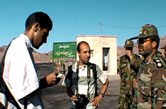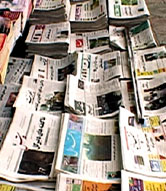
Shargh reporters interview military officials at the scene of a disastrous bus accident in rural Iran Photo: Taghi Amirani |
by Stephen Kinzer
This adaptation of an article originally published in THE AMERICAN PROSPECT was edited in September 2004 specifically for PBS.org. Since then, in June 2005, Iran held presidential elections, electing hardline conservative Mahmoud Ahmadinejad, the mayor of Tehran, by a landslide. According to the BBC, conservatives now control every elected and unelected institution of government in Iran.
“You did a great thing!”
With that unexpected greeting from an Iranian diplomat in New York last December, my trip to Iran began to take shape. A few months earlier I had published a book that tells how, in 1953, the CIA deposed Iran’s last democratic leader, Mohammed Mossadeq, and set his country on a path toward dictatorship and tragedy. Because my book honors Mossadeq, who was a secular liberal and who detested fundamentalism, I hardly expected any representative of the current Iranian regime, especially one who would rule on my visa application, to praise it.
I soon realized, however, that this government official is one of the many Iranians dedicated to the ideals of reform and reconciliation with the West, especially the United States. Most Iranians I had spoken with on previous visits share these views. They are frustrated by their lack of freedom and their country’s isolation in the world. In whatever ways they can, they are pressing for social and political change.
A couple of years earlier, while in the process of researching my book, I had had enormous trouble getting into Iran. Now, suddenly, everything seemed to have changed. The difference could only be that I had published my book resurrecting the figure of Mossadeq. Iran does not observe international copyright conventions, and my book was quickly pirated, translated into Persian, and put on sale in Iran. Readers, especially Iranian readers, might take it as a story of how much Iran was poised to achieve under democratic rule — and how much it lost by falling under royal and then religious tyranny. For better or worse, I became associated with Mossadeq’s view that democracy is the best form of government for Iran. Today’s Iranian reformers also believe that, and their enthusiasm undoubtedly was behind the warm praise with which this Iranian diplomat received my visa application at the end of 2003.
Iran, however, has two governments. One is a functioning democracy, complete with elections, a feisty press, and a cadre of reformist politicians. The other is a narrow-minded clique of mullahs that has lost touch with the masses and sometimes seems to have no agenda other than closing newspapers and blocking democratic change. These governments vie for power every day. Outsiders may be forgiven for seeing Iran as a country that can never make up its mind. Should it punish the prison guards who beat a photographer to death last year, or promote them? Should it cooperate with foreigners who want to monitor its nuclear program, or defy them? Should it allow reformers to run for parliament, or ban them? Iranian officials seem to contradict themselves endlessly on these and countless other questions, changing their positions from one day to the next. Behind that apparent indecision is a constant struggle between the old guard and the democratic insurgents. One group is dominant for a while, then the other surges back.
As the time for my January trip to Iran approached, I began contacting people there to arrange interviews. Among them were powerful figures in the religious regime, some of whom seemed alarmed to learn that a journalist who had written favorably about Mossadeq was being allowed into the country. A few hours before I was to leave, I received a startling message from the Iranian diplomatic mission in New York: Stay home or risk arrest at the Tehran airport.
I will probably never know what led to this sudden change in the regime’s attitude toward me, but I have a theory: Probably I was caught in the same power struggle that envelops all of Iranian public life. Those who promoted my trip and obtained my visa so quickly did so because they hoped I would help propagate their ideals in Iran. Their conservative rivals also suspected I would do that, and when they learned I was coming, they stepped in to cancel my trip.
What happened in Iran at the beginning of this year, when I was supposed to be there, reflected the same ideological tug-of-war that made Iranian officials unable to decide on such a small matter as my visa. A full-fledged political crisis erupted as the parliament, which represents Iranian democracy, clashed with the shadowy Council of Guardians, the voice of reaction and fundamentalism. The council issued an order disqualifying nearly half of the 8,200 candidates who wished to run for seats in parliament. Among them were more than 80 of the 290 incumbents, including no less symbolic a figure than President Mohammed Khatami’s brother. That order triggered a 26-day protest sit-in, a round of recriminations, and, in the end, an election that turned out badly for everyone. Reformers lost most of their seats, including that of Speaker Mehdi Karoubi. Conservatives lost much of what little democratic credibility they had left. But the clearest losers of all were the Iranian people. For now, at least, the option of change through the ballot box is closed to them.
In response to the crisis, Khatami issued statements questioning the Council of Guardians, but refused to challenge it or to criticize Ayatollah Ali Khamenei, the country’s unelected “supreme leader.” That has been a huge disappointment to voters, who elected Khatami in a landslide in 1997 and then again in 2001. Unable or unwilling to fulfill the nation’s reformist hopes, he has gone from the role of national savior to the butt of crude jokes. One of them tells of a woman who has been married for years but is still a virgin. When asked how this is possible, she replies: “My husband is President Khatami. He keeps saying ‘I’ll do it, I’ll do it,’ but he never does it.”
Because politicians have been so unsuccessful in challenging the clerical regime, many Iranians have lost faith not only in them but in the entire political process. Deprived of the chance to vote for candidates of their choice, they stay away from the polls in droves. Their frustration is quite different from the fatalistic lassitude that has shrouded much of the rest of the Middle East for centuries. Iranians are a highly cultured, educated people with a rich history who trace their lineage to the Persian Emperor Cyrus, author of what is sometimes described as history’s first human-rights declaration. (Shirin Ebadi, the Iranian lawyer who won the 2003 Nobel Peace Prize, introduced herself in Oslo as “a descendent of Cyrus the Great, the very emperor who proclaimed at the pinnacle of power 2,500 years ago that he ‘would not reign over the people if they did not wish it.'”)
For more than a century, Iranians have painstakingly been making their way toward democracy. Iran has the human and natural resources to be at least as successful as regional powers like Mexico, Turkey, and Malaysia, but its people suffer under a regime whose failures have given them both an undemocratic political system and plagues of unemployment, corruption, drug abuse, child prostitution, and other forms of social decay. Many find escape in a burgeoning subculture that revolves around the Internet, satellite television, and other subversive tools, but they shy away from political action because no cause or leader captures their imagination.
This year’s [2004] confrontation over who should be allowed to run for parliament was widely covered in the Western press. Some officials in Washington eagerly interpreted it as a sign of the regime’s impending collapse. In Iran, however, it was no big deal. Friends of mine there, whom I heard from by e-mail after my trip was canceled, were unanimous in their disgust.
“The sit-in sounds more serious outside the country,” a journalist wrote. “Most people see it as a political show by reformers to attract people’s support. I highly doubt that they would have been able to get elected even if they were allowed to run. Many say that they were cheated when they voted for the reformers, and that reformers are deeply faithful to the system.” A student in his mid-20s was just as pessimistic. “The reformers have missed golden opportunities since the presidential election in 1997,” he lamented. “Now they want to compensate, but it is so late. People ignore them. We know the conservatives are the worst alternative, but the reformists are a bad one. We are looking for new faces, but there is no one.”
If so many people in Iran are so unhappy with their government, why don’t they rise up and overthrow it? During my last visit there, 18 months ago, I put this question to various people. All gave me the same answer. One university professor put it most succinctly. “We all banded together to overthrow the Shah in 1979, everyone from communists to Mossadeq liberals to religious fanatics,” he told me. “We were able to work together because we all agreed on one thing: Nothing could be worse than the Shah. But what happened? We got something worse. We learned a terrible lesson. You don’t want to go out onto the streets and start the wheel of revolution rolling. You never know where it will lead. It’s better to be patient and unhappy than risk another catastrophe.”
Iranians fervently wish for change, but not through revolution. Nor, despite the fantasies of some in Washington, would they welcome foreign intervention. Such intervention, in fact, would probably be the only thing that would bring many of them to support the regime they loathe. After all, the country’s bitter history has led many Iranians to consider foreign intervention the greatest evil that could befall them. The British robbed them of their oil wealth during the first half of the 20th century, British and American agents organized the coup that crushed their democracy in 1953, and Americans propped up Shah Mohammed Reza Pahlavi for 25 years.
Public opinion in Iran is strongly in favor of democratic reform, and that reform will come, albeit not nearly as quickly as most Americans would like. Iran is not a closed garrison state like North Korea, and its clerical regime is not a self-destructive dictatorship like Saddam Hussein’s. Despite President Khatami’s evident failures, he has shifted the center of political gravity in Iran. Political and social ideas are more freely debated there now than at any time in half a century. Women must still wear veils, but vigilantes no longer brutalize those who show their hair, wear makeup, or talk to men in public. Iran is in a period of transition, and it is in everyone’s interest to allow this process to proceed.
Stephen Kinzer is the author of ALL THE SHAH’S MEN: AN AMERICAN COUP AND THE ROOTS OF MIDDLE EAST TERROR (Wiley, 2003). A veteran correspondent for THE NEW YORK TIMES, he has reported from more than fifty countries and previously served as the paper’s bureau chief in both Istanbul and Berlin.
Article Copyright @ 2004 by The American Prospect, Inc. Preferred Citation: Stephen Kinzer, “Handle With Care”, THE AMERICAN PROSPECT, The Shame of Colin Powell, April 2004 This article may not be resold, reprinted, or redistributed for compensation of any kind without prior written permission from the author. Direct questions about permissions to permissions@prospect.org. The full version of this article is available on The American Prospect website.

